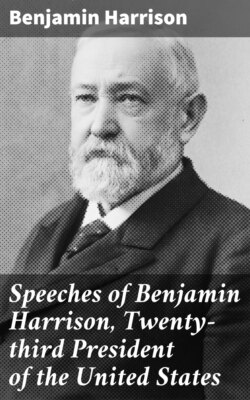Читать книгу Speeches of Benjamin Harrison, Twenty-third President of the United States - Benjamin Harrison - Страница 23
На сайте Литреса книга снята с продажи.
INDIANAPOLIS, JULY 28.
ОглавлениеTable of Contents
Jennings County, Indiana, was represented on the above date by a large delegation under the auspices of the Harrison and Morton Clubs of Vernon and North Vernon. The leaders of their delegation were Fred H. Nauer, J. C. Cope, C. E. Wagner, W. G. Norris, Dr. T. C. Bachelder, T. A. Pearce, P. C. McGannon, and Prof. Amos Saunders. Hon. Frank E. Little, President of the North Vernon Club, delivered the address. General Harrison, in response, said:
My Friends—It is a source of regret to me that I can do so little to compensate those who take the trouble to visit me. I need hardly say to you that I very highly appreciate this evidence of your friendliness and also the kind words which you have addressed to me through your representative. Jennings County has a history of which it may well be proud. It has contributed to the city of Indianapolis some of our most distinguished and useful men. Your spokesman has not exaggerated the fidelity and steadfastness of the people of your county. Your republicanism has been as straight as the walls of your cliffs [applause] and as solid as the limestone with which your hills are buttressed. [Applause.]
You have said to me that you are in favor of a free and equal ballot the country over. We are so related in our Government that any disturbance of the suffrage anywhere directly affects us all. Our Members of Congress pass upon questions that are as wide as the domain over which our flag floats. Therefore, our interest in the choice of these representatives is not limited to our own districts. If the debate upon public questions is to be of value the voter must be free to register his conclusion. The tribunal which is to pronounce upon the argument must not be coerced.
You have said to me that you favor the doctrine of protection. The Republican party stands for the principles of protection. We believe in the preservation of the American market for our American producers and workmen. [Applause and cries of "That's it!"] We believe that the development of home manufactures tends directly to promote the interest of agriculture by furnishing a home market for the products of the farm, and thus emancipating our farmers from the transportation charges which they must pay when their products seek distant markets. [Applause.]
We are confronted now with a Treasury surplus. Our position is exceptional. We are not seeking, as many other nations are, new subjects of taxation, new sources of revenue. Our quest is now how, wisely, to reduce our national revenue. The attempt has been made to use this surplus as a lever to overturn the protective system. The promoters of this scheme, while professing a desire to diminish the surplus, have acted as if their purpose was to increase it in part by opposing necessary and legitimate appropriations. I agree that there is danger that a surplus may promote extravagance, but I do not find myself in sympathy with that policy that denies the appropriation necessary for the proper defence of our people, and for the convenient administration of our public affairs throughout the country, in order that the threat of a surplus may be used for a sinister purpose. I believe that in reducing our revenues to the level of our needful and proper expenditures we can and should continue to favor and protect our industries. I do not like to entrust this work to those who declare protective duties to be vicious "legalized robbery." The Republican party has by its legislation shown its capacity wisely to reduce our revenues and at the same time to preserve the American system. [Applause.] It can be trusted to do the work that remains, and to do it wisely. [Applause.]
